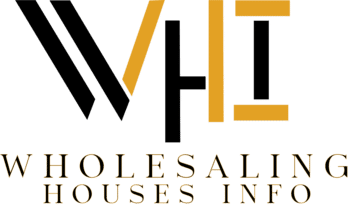How to Buy a House in Foreclosure
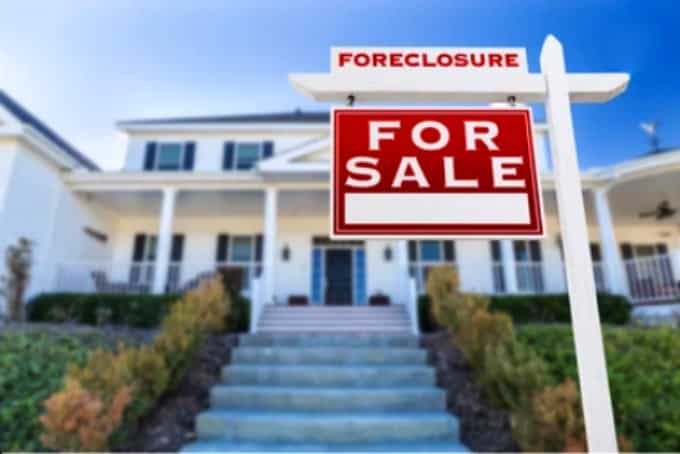
Real estate investments can cost a lot of money and be very high risk. Unless you buy your investment property wisely. One of the best ways to lower your risk and save money is by buying a house in foreclosure.
Table of Contents
What is a Foreclosure?
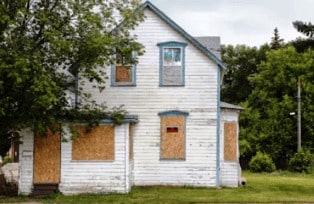
When a homeowner can no longer pay the mortgage installments or loan, the home will fall into foreclosure. In other words, the mortgage lender or bank will take full ownership of the house.
When the lender or mortgage company gets full ownership, they will sell the house to recover their cash. In most cases, the price of the house in foreclosure will cost less than market value. Hence, you can easily get the house at a low price and later sell it for a profit.
The Foreclosure Process
Before buying a house in foreclosure, it would be good to understand the foreclosure process.
Pre-foreclosure
Before a foreclosure can begin the homeowner must be delinquent in their mortgage payments for a period of time. Usually about 3 or more months. This stage is considered the pre-foreclosure. It is not a foreclosure but a potential foreclosure. To save themselves from this debt and ruining their credit a homeowner would have to make their loan current.
If they are unable to make their loan current they may choose to sell the house quickly for a low price. In some cases before anyone can buy the home, the bank or lender may have to approve the sale. If the bank or lender agrees to sell the property, you can proceed with further paperwork.
Pre-foreclosure is the time when you have a small window of opportunity to buy the home directly from the homeowner.
Foreclosure
If the homeowner is unable to make back payments and bring their mortgage loan current, the home will enter the foreclosure process. This is where the bank starts processing the legal documents to take full possession of the home.
Once the process is complete the homeowner will then receive notification of foreclosure and the date by which they must vacate the premises. In some cases this will also include an auction date for the sale of the home.
Where to Find and Purchase Foreclosed Homes
The following are the two basic strategies to find and purchase foreclosed homes:
Auction

After a bank has foreclosed on a home they will most likely sell the home through an auction. This is where buyers are able to bid on the home in question. Depending on your knowledge of the housing market, you can proceed to bid on the house at the auction based on your ability to make a profit.
Keep in mind this strategy is very risky because you are not allowed to enter the property in order to assess damages or repair costs. The home is sold as is. There may be a lot of surprises that pop up.
Another issue you may come across is that you may not be the only one bidding on the home. This might make it difficult for you to get a great deal.
Real Estate Owned (REO) and Government-owned Listings
The next option available for buying a house in foreclosure is REO. You can directly go to the home listings of the mortgage lender. You will find all the information directly on the listing. From there you can proceed to buy the home if you like it.
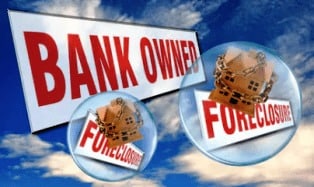
In the same way, if the loan is insured by the federal government, it will be considered as government-owned. Hence, if someone fails to pay the mortgage loan insured by the government, the house will go to the government-owned listings. You can also purchase a house from there.
Depending on the mortgage lender, an internet search can help you find all these types of listings.
Steps for Buying a House in Foreclosure

The four basic steps to buying a house in foreclosure.
Total Time: 30 days
Know your requirements

The first thing you need to do is to know your requirements. What is your budget? Will you be able to make a profit? You will plan this by taking into consideration the location, condition, age of the home, and your MAO (maximum allowable offer).
Find the foreclosure houses

The following are 3 basic ways to look for foreclosed homes:
• Have a real estate agent look for foreclosed homes on the MLS and send you a list.
• Look for the foreclosure listings online yourself.
• Drive around neighborhoods you are interested in and look for homes that have signs that say foreclosed home for sale.
There are many other creative ways you can find foreclosed homes. These are just some of the basic ways.
Run the analysis

Do your due diligence and run a Comparative Market Analysis (CMA). This will give you information that you need about the home in order to figure out its current market value.
If you are going to an auction you need to ensure that you have enough cash for the purchase. Foreclosed houses are sold in “as-is” condition. In other words, no one guarantees the condition of the house. Keep this in mind before making your purchase.
Plan for the worst and hope for the best. In order to mitigate your risk, treat each home as if it would need substantial repairs. This way when you run your numbers you will have a good margin of error. Foreclosure homes might need a lot of repairs. So, you need to be ready for it.
Make the purchase
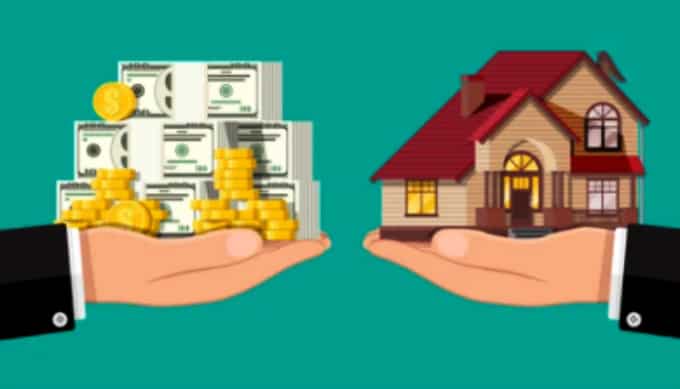
The last thing you need to do is make the purchase. Later on, you can rent, sell or flip the foreclosed house and make a good return on your real estate investment.
Estimated Cost: 100000 USD
Supply:
- Computer
- Internet
- Phone
Tools:
- Mode of transportation
- Real estate investment software
Materials: Foreclosure leads
Conclusion
Buying a house in foreclosure is a great way to make a profit but also involves some risk. To mitigate this risk, do your due diligence, be conservative in your calculations, and stay within your budget. You should now be on your way to making profits investing in foreclosed homes.
Buy a House in Foreclosure FAQ’s
What Happens When a Home is in Foreclosure?
Home buyers typically purchase their property either cash or take out a mortgage loan from their lender. When taking out such a loan, lenders provide contracts outlining the terms for paying back the loan; should payments become delinquent, or even miss altogether, then their lender may decide to foreclose on it – first offering loss mitigation solutions such as forbearance or loan modification as loss mitigation steps before starting foreclosure proceedings within 30 days if no response or correction occurs within this time.
Rather, lenders use trustee’s sales or REO procedures to sell it off instead. New York state has an REO process that is more extensive and allows borrowers to remain in their property longer due to being subject to court jurisdiction. This often works in favor of them by giving them more time in which to remain there.
As part of the foreclosure process, lenders will file and publish notices of trustee’s sale in local newspapers, followed by property auction. Most often than not, auction proceeds fall short of covering debt owed by borrowers leaving them with what is referred to as a deficiency amount due. Lenders may garnish wages in order to collect them at the conclusion of foreclosure proceedings if deficiencies remain outstanding after these steps have taken place.
Most foreclosure buyers are investors with cash. But if you’re interested in purchasing one as an owner-occupant, be sure to obtain a mortgage preapproval letter and have a qualified home inspector inspect the property prior to making any offers. Any needed repairs might require financing through conventional loans or government-backed FHA, VA and USDA loan programs – either way you should plan ahead.
How to Buy Foreclosed Homes with No Money Using Loan Assumption?
Many novice real estate investors lack the funds necessary to purchase foreclosed homes outright, yet can still enter the market by bidding at auctions for foreclosures and competing with more experienced house flippers who have access to more capital. Loan assumption could also provide an avenue to buy foreclosed properties without using money – although mortgage qualification requirements would need to be fulfilled first.
Your local county recorder’s office can help you discover foreclosed properties by searching through homes that are in foreclosure and providing a rough idea of their market value. Once identified, further research should be performed on both lender and home to ascertain if loan assumption would be possible; if so, simply call them up to explain that you’d like to assume their loans without qualifying for new ones.
Lenders may deny your loan assumption request for various reasons, including being concerned that you won’t be able to meet payments and maintain the property appropriately. Some lenders may also be unwilling to allow you to assume their mortgages as they attempt to maximize profits by selling properties at auction.
If your loan assumption request is declined by one lender, consider exploring other avenues or considering other means of purchasing foreclosed properties. For instance, you could seek to purchase foreclosed properties that have yet to go through foreclosure sale or are owned by banks (REO properties). Unfortunately, such properties often need extensive repairs that make them expensive to acquire.
What are the Risks of Buying a Foreclosure?
Real estate investing with foreclosures can be a wise financial move, though not without risks. Although you might hear horror stories online about buying them, most investors who purchase foreclosures do so with great care and due diligence – conducting thorough inspections while adding extra financial padding in case anything goes amiss with their purchase. Foreclosures can make great investments for real estate investors!
One risk in purchasing at auction is that it might need substantial repairs; because homeowners struggling with debt often neglect maintenance duties and let maintenance lapse, many foreclosures require extensive work before being habitable again. Furthermore, you won’t have the ability to order a home inspection before bidding begins.
Another threat is purchasing property with existing liens or code violations that you won’t become aware of until after performing an in-depth title search. If your plans include renting or flipping it, this could prove disastrous; previous occupants might have stripped out copper wiring, appliances and fixtures prior to moving out causing irreparable damage that can only be discovered through thorough inspection.
Last, there is the risk that banks might not be able to close quickly enough on a foreclosure. When purchasing through auctions, the process can become drawn-out and lengthy; it would be wise to consult a real estate attorney beforehand for guidance in legal proceedings related to buying foreclosure properties.
Every real estate investment carries some level of risk, but investing in foreclosed properties may provide an excellent way to build wealth while owning an affordable place to call home. Even with these potential downsides, great deals may still exist on such properties.
Should I Hire a Real Estate Agent When Buying a Foreclosed Home?
An agent affiliated with the National Association of Realtors (NAR) can be an invaluable ally when it comes to understanding foreclosed homes in your locality and helping determine your eligibility for home loans by analyzing your debt-to-income ratio, or how much of your monthly income your new mortgage will consume.
An experienced foreclosure agent can guide you through the entire process of acquiring foreclosed properties, from finding properties to understanding state REO buying laws and ordering an inspection report. They’ll also be able to identify any challenges or complications during the foreclosure process that might arise.
If you’re hoping to buy a foreclosed property at auction, your real estate agent can assist in your preparation by researching its history and reaching out to trustees responsible. They’ll also assist in finding financing solutions and closing sales when necessary.
Real estate agents are an invaluable asset when purchasing foreclosed properties as-is. They can assist in assessing their condition and estimate repairs needed, evaluate competing offers and set a competitive price point, provide recommendations of local contractors/landscapers/service providers as well as offer dual agency – which creates conflicts of interests when purchasing foreclosed property.
Where Can I Find Foreclosure Listings?
Foreclosure listings can provide buyers looking for an affordable home with lower prices than similar homes available nearby a great opportunity. There are various ways of finding foreclosure listings such as through real estate agents, bank-owned property websites and government agencies as well as Zillow itself that also list them.
When a borrower falls behind on monthly mortgage payments and their lender issues them a notice of default or delinquency on their loan, foreclosure proceedings begin. A timeframe may be given for them to catch up or pay any missed fees during what’s known as preforeclosure period – if they fail, their home may be taken back by the lender for sale and taken back possession by them.
Large national lenders frequently sell foreclosure packages bundled together and sold directly to investors through websites like HUD and Fannie Mae; interested buyers will need the services of an approved real estate agent for successful completion of transactions.
Seasoned investors can utilize local newspaper listings in the legal notices section to locate trustee sales and auctions, or they can ask real estate agents who specialize in foreclosures to assist them in finding opportunities or refer them to brokers who specialize in them.
What are the Steps to Getting Preapproved for a Mortgage?
Prequalifying for a mortgage is the first step toward becoming a homebuyer and will streamline your loan process when you find your dream house. Lenders will review all of your financial information, such as income and debts, to verify whether you qualify for an amount and rate within your budget. Typically this takes anywhere from several days up to several months depending on your unique situation – this process may even take longer if there is significant debt or recent foreclosure on your credit report.
Preapproval isn’t binding with any lender and can be cancelled at any time, though many offer grace periods of up to 60 or 90 days in which to shop for homes and show agents that you’re serious about buying. Therefore, it is ideal to get preapproved early so as to gain confidence in budgeting your purchases without unexpected surprises later down the line.
Note that your preapproval simply provides an idea of your potential affordability as a homeowner; it does not guarantee that any specific amount or loan program will be approved. An actual mortgage application requires more detailed evaluation, including verification of employment and income as well as assessment of your debt-to-income (DTI) ratio which measures how much of your monthly income goes toward repaying existing debts.
How Much to Offer on Bank-owned Property?
As a homebuyer or investor, you may come across REO properties (Real Estate Owned). These are homes foreclosed upon due to a default on their mortgage by their lender and can sometimes represent great deals. But how can you determine an offer amount on an REO property?
First and foremost, it is important to recognize that banks are interested in selling properties quickly and for maximum money possible. As each day that passes without selling increases the carrying costs (i.e. taxes and upkeep costs). Therefore, banks are likely to accept reasonable offers that come close to reflecting what the property actually costs them – they’re more likely to accept offers closer to its actual worth than offers with low or no real offers at all.
After purchasing your property, be sure to conduct a comprehensive inspection on it. This should include a certified appraisal, title search and clearance, environmental report if applicable and vacant property inspection in order to assess repairs that may be required.
Banks will most likely respond to your offer with a counter-offer, which they may or may not accept depending on their financial goals and real estate market condition. Expect this process to take longer than regular sales because banks need approval from investors, shareholders and auditors before making their decisions; but it could be well worth your while for finding an excellent real estate deal!
